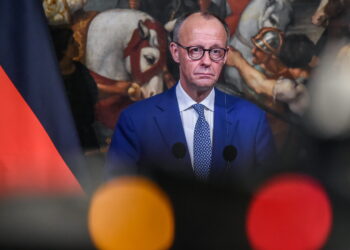And so, Friedrich Merz unwittingly inaugurated a new phase in German history. This morning, the Bundestag was packed with prominent personalities, even Angela Merkel, who had pushed him out of politics 20 years ago; there was even an astronaut in the audience box. So many prominent Germans were ready to greet Merz’s presumably foregone election as chancellor.
Instead, they — and many Europeans interested in the issue — all witnessed a historic moment: for the first time, a candidate for chancellor, with an already decided government pact and list of ministers, and a majority on paper — though not a large one — failed; by a handful of votes, but he didn’t make it. Even the Germans have discovered the phenomenon of rebels – those parliamentarians in your party who, taking advantage of the secret ballot, vote against you.
He had to wait a few hours of negotiations, and a second vote that was even slightly larger than expected, to become chancellor.
It is not a good time for Germany, with the AfD party accused by the intelligence services of essentially echoing Nazism, while citizens, according to polls, are choosing it as the country’s leading party. A coalition — no longer the “grand” one of the past, with total control over Parliament, but perhaps now just a “narrow” one — of solid democratic tradition, and yet it fails to form a government because it shoots itself in the foot is a very troubling story.
It certainly is not the ideal path for Germany to take back its leading role in the European Union, a role that Merkel broadly undermined with her agreements with Russia and China, which did not look to the future of the Union but only to Germany’s short-term interests. Now, progressively, the two historic parties are emptying, the liberals are just a memory (although it is in their tradition to be in and out of the control room), and the consensus is growing toward nationalists, anti-Europeans, racists, and nostalgic for Nazism.
It is a stop, admittedly symbolic, at least we hope so, but it is a clear testimony to the inability of traditional democratic forces to provide answers to citizens’ concerns. The great European People’s Party, which recently met at its Congress in Spain, had announced that it was “leading” the Union.
Perhaps there has been a bit of short-sightedness. Maybe the rush to chase after the far-right’s policies, to mimic their agendas — as has been said, with great obviousness, but also with remarkable realism — ends up rewarding the original more than the copies. Democratic zealots may be tired, they may no longer have good leaders, but they still have significant responsibilities, which they must begin to assume by proposing a truly alternative project to that of the extreme right. After all, for 80 years, democratic forces have made freedom, economy, security, and education grow in Europe. Reviving that project would help.
English version by the Translation Service of Withub


![[foto: Emanuele Bonini, Eunews]](https://www.eunews.it/wp-content/uploads/2025/07/polonia-danni-350x250.jpeg)





![Isabel Vansteenkiste (sinistra) sarà la nuova consigliera particolare della presidente della Bce, Christine Lagarade (destra).
[foto: European Central Bank; Wikimedia Commons]](https://www.eunews.it/wp-content/uploads/2025/07/vandlagar-120x86.png)

